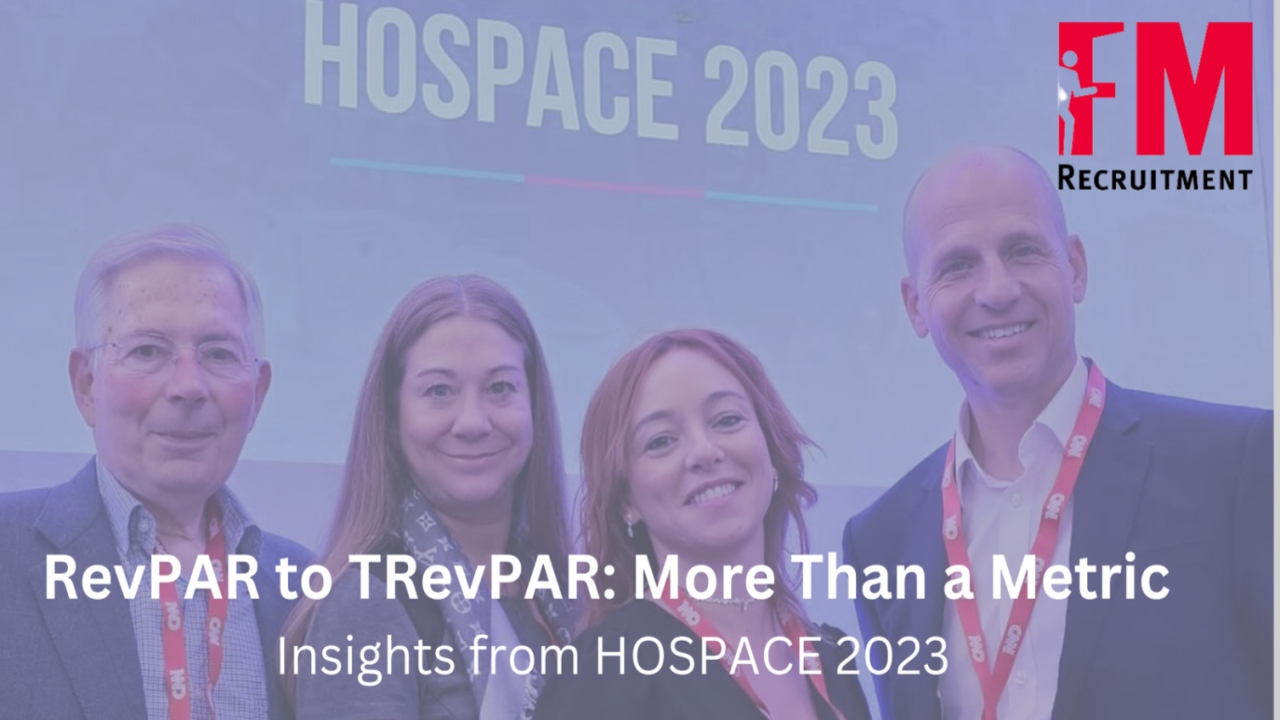Introduction
As proud sponsors of HOSPA, FM Recruitment’s Chris Denison Smith, Andrea Shaw and Tairona Lattanzi had the privilege of attending HOSPACE 2023 last week at the Royal Lancaster London. Here we share some of their insights and observations. This year’s conference echoed many of the themes and discussions encountered in similar gatherings throughout 2023, however, offered an additional comprehensive and practical insight from the perspective of the UK’s specialist hospitality leaders.
From the integration of Artificial Intelligence (AI) to an evolving approach to measuring success, the event provided a valuable forum for these leaders to share ideas and strategies for navigating the hospitality landscape.
The Role of AI: Augmenting, Not Replacing the Human Touch
As we have previously reviewed, the impact of Artificial Intelligence and its role in the hospitality industry was a popular theme running through the day. However, the narrative certainly seems to have shifted from the worry of AI as a potential replacement for (human) employees to an enthusiasm for a tool that enhances and complements human capabilities. The discussions centered around the importance of preparing team members to effectively utilise these technologies, while also being adept at managing any technical shortcomings.
Effectively training employees to operate technologies and empowering them with the skills and acumen to intervene when technology can sometimes fall short, is something that the best businesses have been doing for years, and in this sense, AI is just another technology that could otherwise be badly served by a disinterested employee.
The warmth, empathy, and personal attention that employees should provide, are irreplaceable and often make the difference in guest satisfaction. Therefore, while AI can enhance efficiency and personalisation, it won’t replace the need for human interaction in the hospitality industry. The future of hospitality lies in a balanced synergy between AI and human ingenuity, where technology is used as a powerful tool to augment, not replace, human service.
Persistent Resourcing Challenges
The UK’s hospitality industry continues to face significant recruitment and retention challenges and this topic was extensively discussed at the conference. The latest Quarterly Recruitment Outlook report from the British Chambers of Commerce reported that 79% of hospitality firms were struggling to fill roles in Q3 2023. While this may be a slight decrease from the previous quarter’s (86% in Q2) the hospitality sector, is still the industry most likely to be experiencing challenges. Industry bodies attribute this to a combination of factors, including the aftermath of the coronavirus pandemic and the implications of Brexit.
Shift in Revenue Metrics: From RevPAR to TRevPAR
A significant shift in the industry’s approach to measuring success was also evident at the conference. Total Revenue per Available Room (TRevPAR) has overtaken Revenue per Available Room (RevPAR) as the most important metric. This shift indicates a broader focus on the profitability of the entire stay, encouraging hotels to maximise opportunities for incremental spend.
TRevPAR, unlike RevPAR, considers revenue generated from all departments of a hotel, including rooms, food and beverage, spa, parking, and other amenities. This comprehensive metric provides a more holistic view of a hotel’s financial performance, helping hoteliers identify areas where they can increase revenue.
In terms of maximising opportunities for incremental spend, hotels are exploring innovative ways to merchandise their space. For example, transforming lobbies into chargeable co-working areas or converting dormant meeting rooms into extensions of the restaurant. These strategies not only increase TRevPAR but also enhance the guest experience by offering additional services and amenities.
The Evolving Role of the Revenue Manager
The knock-on effect of a more holistic approach to total revenue metrics is the expanding scope of the hotel revenue manager. Traditionally focused on managing room rates and negotiating commissions on distribution channels, revenue managers are now at the forefront of strategic and commercial decision-making. With the influx of new data sets and technology, their role has become more sophisticated, requiring a blend of analytical skills, market research, and critical thinking.
Revenue managers are increasingly seen as the hub of hospitality commercial teams, tasked with a wide range of responsibilities, including implementing and operating technology systems and aligning closely with sales, marketing, and e-commerce. They are expected to lead and solve complex problems, optimising profit while navigating the challenges posed by new data and technology.
USALI: First Update since 2015
To further support this evolution, the conference also shed light on the most recent update to the Uniform System of Accounts for the Lodging Industry (USALI). This update, released late last year and the first since 2015, reflects the change in the industry over the past decade, with new schedules and categories for tracking financial performance. The changes included the introduction of the Energy, Water, and Waste (EWW) Schedule, expanded definitions for rate categories, and enhanced guidance for tracking costs associated with Guest Loyalty Programs. The advice from the financial specialists at HOSPACE underscored the importance of financial controllers becoming certified in the system.
Keeping the Faith – Outlook for 2024-2025
Looking ahead, the industry’s outlook for 2024-2025 remains steady, with a focus on maintaining high rates and profitability. The expectation is that customers are willing to pay more for high-quality experiences that deliver a higher level of perceived value. This offers opportunities for driving incremental spend and repurposing underutilised space for additional revenue. Increased hotel supply in cities such as London, Edinburgh and Manchester will certainly challenge businesses to drop rates but with revenue managers holding firm so far, we may continue to see growth.
Conclusion
HOSPACE 2023 provided a wealth of insights into the current trends and future directions of the hospitality industry. The discussions and themes resonated with those observed in similar events throughout the year, emphasising the importance of AI as a tool to enhance human work, the ongoing staffing challenges, the evolving role of revenue management, and the significance of financial tracking systems like USALI. As the industry continues to navigate these challenges and opportunities, the focus remains on balancing technological advancements with the irreplaceable human touch in hospitality.
If you would like to discuss any of the topics that have been discussed here or any other elements of your people strategy, then please contact:
Chris Denison Smith at chrisdenisonsmith@fmrecruitment.co.uk / +44 208 600 1160
Andrea Shaw at andreashaw@fmrecruitment.co.uk / +44 20 8600 1161
Tairona Lattanzi at taironalattanzi@fmrecruitment.co.uk / +44 20 8600 1164


